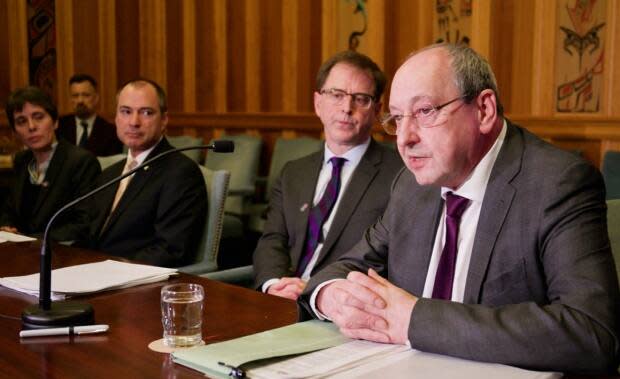B.C. moving ahead with massive reform of system for regulating health-care workers
B.C. is pushing ahead with a major overhaul of its system for regulating health professionals, but there's still no word on when people like psychotherapists and clinical counsellors might finally be subject to official oversight.
On Thursday morning, a cross-party committee consisting of Health Minister Adrian Dix, Liberal health critic Norm Letnick and Green Party health critic Sonia Furstenau released their final report on recommendations for modernizing B.C.'s regulation system.
The plan includes collapsing the number of regulatory colleges from 20 to six, creating a new oversight body to ensure the colleges are performing as they should, eliminating elections of college board members and making the complaint and discipline process more transparent to the public.
Dix said the changes will help bring B.C. into the 21st century, doing away with a system that reflects ideas that are now 30 years old.
"This is an extraordinary step, I think," Dix told reporters. "It certainly will put B.C. on the cutting edge."
The health minister said some of the changes will require legislative approval, and he expected them to go before MLAs next spring. Other changes could be made in cabinet before then, and colleges can begin the amalgamation process any time.
Information about all disciplinary actions would now be made available to the public. Right now, the colleges only publicize the outcomes of patient complaints when they are deemed to be a "serious matter."
Letnick said that change is all about protecting the public.
"The media have a key role to play in making sure the public is safe and they need to have this information," he said.
"The public should also be having information that might or might not impact their health-care decisions."
Long-awaited regulation coming — eventually
The committee says the recommendations will help streamline the process of regulating new professions, including psychotherapists, who have been lobbying the B.C. government for regulation since the 1990s.
Emergency medical assistants and social workers, who are currently only partially regulated, will also be priorities to join the six amalgamated colleges.
However, there is still no timeline for making that happen.
Nonetheless, Glen Grigg a clinical counsellor in Vancouver and chair of the Federation of Associations for Counselling Therapists in B.C., said he's feeling optimistic about the prospect of regulation for his profession.
"We want to reach out to the health minister because what we want to say.... 'We have done our homework. We want to show you everything that we've done to be ready for this move,'" Grigg said.
Thursday's announcement is the latest step in a process that began more than two years ago when international regulation expert Harry Cayton was appointed to look into numerous concerns about dysfunction at the College of Dental Surgeons of B.C.
In the spring of 2019, Cayton recommended a complete overhaul of B.C.'s system for regulating everyone from doctors and nurses to naturopaths and massage therapists, writing that "there is a lack of relentless focus on the safety of patients in many but not all of the current colleges."

Cayton charged that governance of the colleges "is insufficiently independent, lacking a competency framework, a way of managing skill mix or clear accountability to the public they serve."
Changes to college boards and oversight
The province's current plan has been tweaked slightly from recommendations released last fall, following consultation with the public and health professionals.
It includes a new oversight body that will set performance standards for the colleges, audit them and report on their performance, as well as oversee the appointment of college board members.
Because of concerns that members of college boards can sometimes prioritize the interests of practitioners rather than the public they serve, there would be no elections for college boards. Members instead would be appointed through what is meant to be a competency-based process, with half chosen from the professions and half from the public.
Meanwhile, the process of handling complaints would be revamped to separate the investigation and discipline procedures.
The collapsing of colleges has already begun, with the provincial College of Podiatric Surgeons and College of Physicians and Surgeons set to merge on Aug. 31, and the College of Midwives joining up with the College of Nursing Professionals a day later.
Dix said that combining colleges will allow for "economy of scale," pooling resources and expertise to do things like investigate complaints.
"Of course there's some apprehension when you talk about bringing people together, reducing the number of colleges," he said.
But he added that there was strong public support for the idea during the consultation process.
The six amalgamated colleges recommended by the committee would include:
Pharmacists
Nursing Professionals and Midwives
Physicians and Surgeons
Oral Health Professionals, covering dentists, denturists, dental hygienists, certified dental assistants, dental technicians and dental therapists.
Allied Health and Care Professionals, covering dietitians, occupational therapists, opticians, optometrists, physical therapists, speech and hearing professionals, and the diagnostic and therapeutic professions.
Complementary and Alternative Health Care Professionals, covering chiropractors, naturopaths, massage therapists, acupuncturists and traditional Chinese medicine practitioners.

